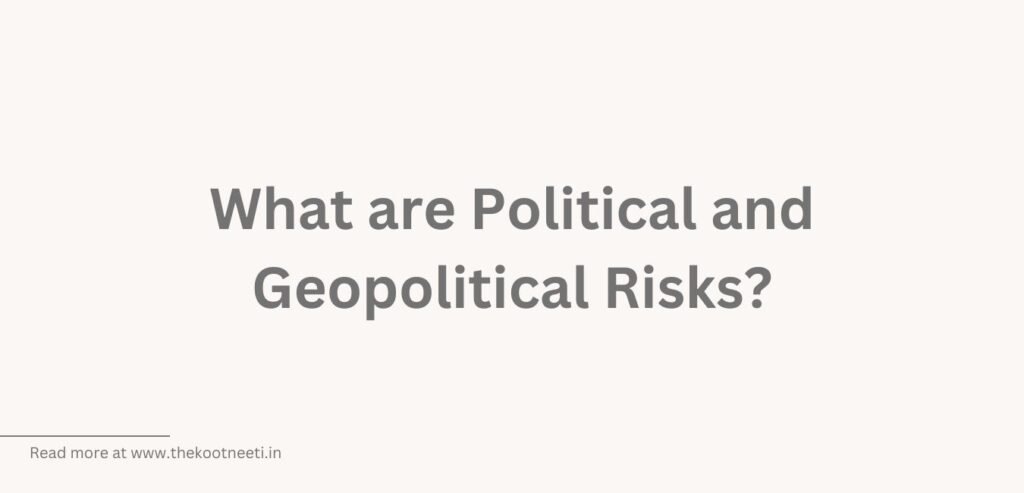What are Political and Geopolitical Risks?
Political risk is the risk that political events or developments in a country or region will have an adverse impact on the interests of an individual or organization. Political risk can take many forms, including risks related to the stability of a country’s political system, risks related to changes in government policy, and risks related to social or political unrest.
Political risk is often a concern for businesses and investors, as it can affect the stability and predictability of a country’s economic and regulatory environment. Political risk can also affect the ability of businesses and investors to operate or invest in a particular country, as it can create uncertainty or instability.
Political risk can be managed through a variety of means, including through the use of risk assessment tools and by diversifying investments across different countries and regions. Governments and international organizations may also provide support to businesses and investors by promoting political stability and by providing information about the political environment in different countries.
Geopolitical Risk
Geopolitical risk refers to the risk of political, economic, or military events or developments in a particular region or country having an adverse impact on global politics or the global economy. Geopolitical risk can be driven by a variety of factors, such as changes in the balance of power among states, the emergence of new global challenges, or shifts in the global economic or political landscape.
Geopolitical risk is often a concern for businesses and investors, as it can affect the stability and predictability of the global economy and can create uncertainty or instability in global markets. Geopolitical risk can also affect the ability of businesses and investors to operate or invest in particular regions or countries, as it can create risks related to the stability of the political or economic environment.
Geopolitical risk can be managed through a variety of means, including through the use of risk assessment tools and by diversifying investments across different regions and countries. Governments and international organizations may also play a role in managing geopolitical risk by promoting political stability and by addressing global challenges such as climate change or terrorism.
Geopolitical Risk studies
Geopolitical risk studies is the field of study that focuses on understanding and managing the risks associated with political, economic, and military events or developments in different regions or countries. Geopolitical risk studies may draw on a wide range of disciplines, including political science, economics, international relations, and security studies, among others.
Geopolitical risk studies programs may include courses on topics such as international relations, political economy, conflict resolution, and security studies. Geopolitical risk studies programs may also include practical training in skills such as risk assessment, crisis management, and strategic planning.
Geopolitical risk studies programs are offered at universities and colleges around the world, and may be found in departments of political science, international relations, or business, among others. Some geopolitical risk studies programs also offer practical training and experiential learning opportunities, such as internships or study abroad programs.
Geopolitical risk studies is an interdisciplinary field that draws on a wide range of perspectives and approaches, and it is often seen as a way to bridge the gap between theory and practice in the field of international relations and global affairs.
Geopolitical Risk Index
A geopolitical risk index is a tool that is used to measure and analyze geopolitical risk in order to inform decision-making and risk management strategies.
Geopolitical risk indices typically use a variety of data sources, including news articles, government reports, and other sources of information, to measure and assess geopolitical risk in different countries or regions. These indices often take into account a wide range of factors, including political stability, economic conditions, social and demographic trends, and the presence of conflict or other types of instability.
Geopolitical risk indices are used by a variety of actors, including governments, businesses, and investors, to inform their decision-making and risk management strategies. They can be helpful for identifying countries or regions that may be more or less risky for investment, trade, or other types of engagement. However, it is important to note that geopolitical risk indices are not always accurate or comprehensive, and they should be used as one tool among many when assessing geopolitical risk.




















